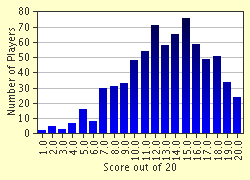Quiz Answer Key and Fun Facts
1. Who issued a doctrine in 1824 that could be considered a self defense doctrine?
2. What guerilla warrior was given the nickname "Swamp Fox"?
3. Who lost to Gates at Saratoga in October 1777?
4. Who is the author of "Common Sense"?
5. Who started the process of Judicial Review?
6. Who was the first secretary of war?
7. Who was the first colonial shot in the Boston Massacre?
8. Who did Washington defeat at Yorktown in 1781?
9. Who sold the Louisiana Purchase to the USA in 1803?
10. Who was the U.S. president at the Time of the Louisiana Purchase?
11. Who won the battle of New Orleans in 1815?
12. Who was the first person to map the Louisiana territory acquired in 1803?
13. Which US president could be described as a "cold, confident, irritable Federalist from Quincy, Massachusetts?"
14. Which future US president defeated a Shawnee alliance in the Battle of Tippecanoe in 1811?
15. Whigs are to patriots as ______ are to loyalists?
16. True or False: Alexander Hamilton is affiliated with the Federalist party.
17. True or False: The Federalist party was pro-agriculture.
18. True or False: The Democratic Republicans were pro-French.
19. John Adams was a Democratic Republican.
20. What was the first war that the U.S. was involved in to be funded partly by lottery tickets?
Source: Author
boblarry
This quiz was reviewed by FunTrivia editor
trammgr before going online.
Any errors found in FunTrivia content are routinely corrected through our feedback system.


